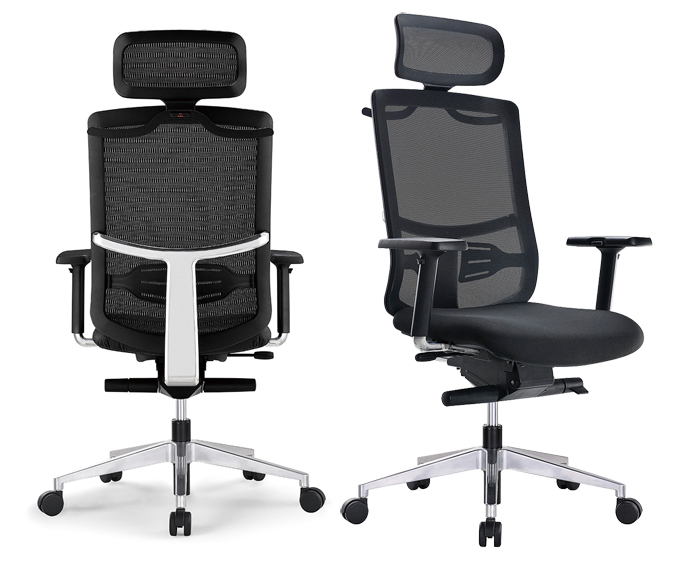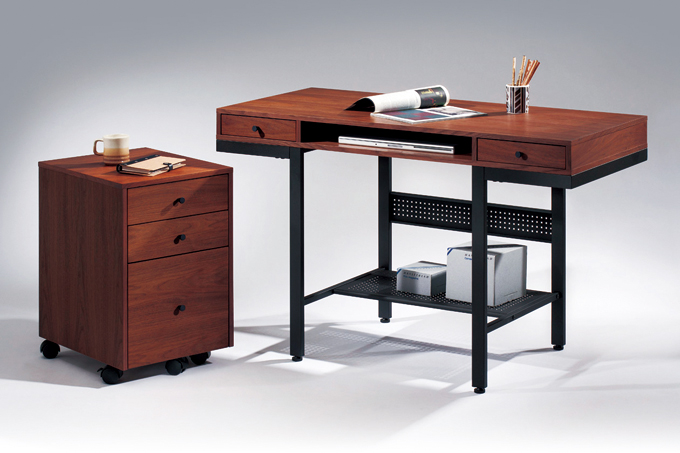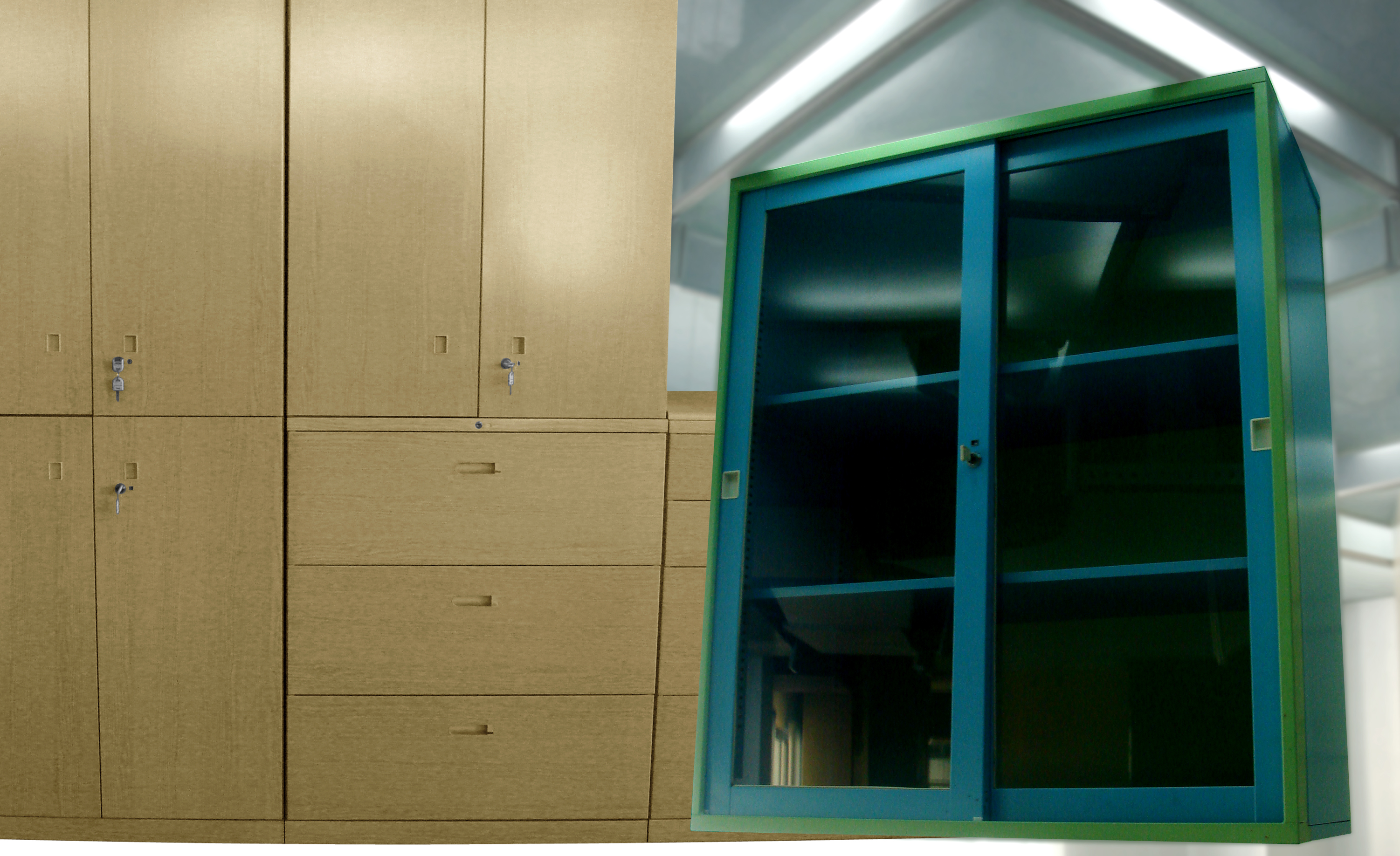Taiwan's Office Furniture Makers Strive to Maintain Market Niche
Stay-at-home manufacturers focus on high quality and small-batch production
2013/04/11 | By Judy LiWith the massive outflow of furniture manufacturers over the past two decades, Taiwan's furniture industry has downsized so much that today there are fewer than 100 export-oriented manufacturers still operating on the island. Over half of them run factories both at home and abroad, mainly in mainland China and Southeast Asia, and about a third seem to focus on the production of metal furniture, mostly office furniture items and related parts.
Thanks to the stable supply of locally-produced raw materials including steel, plastics, glass, and cloth, Taiwan's office furniture makers can turn out innovative high-end products at reasonable prices. This keeps them competitive in the global market, and makes them willing to continue manufacturing on the island.
Industry experts say that people nowadays spend more time at work than they used to, and this results in a strong demand for comfortable seats and convenient office desks. To fill this demand, Taiwanese furniture makers have developed ergonomic chairs with adjustable seats and backs as well as space-saving knock-down desks and file cabinets.
“Innovation, comfort, and convenience are driving Taiwan's office furniture industry and helping maintain its strength in the world arena,” comments a senior official of the Taiwan Furniture Manufacturers' Association (TFMA). “Today's office furniture is more sophisticated than before, and it usually serves more than one purpose. It relies heavily upon the advancement of technology and matches trends in the consumer market.”
Rising global sentiment for environmental protection has pushed furniture makers to fabricate eco-friendly furniture by using ‘green' materials that can be reused, reduced, replaced, and recycled, since more and more countries have applied stricter ‘green' standard to furniture items.
After more than two decades of making OA chairs, Jia Goang Furniture Industry Co., located in Nantou, central Taiwan, is one of the leading office chair makers in Taiwan. Jia Goang focuses on the production of high-end, eco-friendly, and ergonomic office chairs.

In-house Operation Assures Quality
The company handles almost every step of product development and production, from design and raw materials procurement to manufacturing, quality control, and final packaging. It has built up a good image with its high-end innovative products.
To secure consistent quality, Jia Goang is very careful in the selection of materials, including metal, nylon, and other plastics, mostly from reputable local suppliers. “We started to apply specially-processed plastic materials to our OA chairs in 1996,” notes a senior company official, “because it can help enhance the comfort, durability, safety, and environmental friendliness of the chairs.”
The company has devoted constant efforts to the upgrading of manufacturing technology and management, gaining ISO 9001 certification in 2001. Ever since then it has worked even harder to keep up the high standard required by the certification.
To explore the huge market in China, Jia Goang entered into an alliance with the Shanghai Inrun Corp. in 2000 and formally entered the market there two years later. With the cooperation of Shanghai Inrun, in 2004 Jia Goang won a gold metal in office furniture design at “Furniture China,” an international furniture exhibition held in Shanghai. A bronze medal at the same exhibition followed in 2010.
Today the company runs plants on both sides of Taiwan Strait, with one in Taiwan generating a variety of high-quality items at small volumes that are turned out by a workforce of 40 persons, and one in China producing single items at mass volumes by over 150 workers.
The China plant sells 70%-80% of its products to the local market there and exports the remaining 20%-30%. The Taiwan plant's ratios are just the opposite; it exports 70%-80% of its output and sells the remaining 20%-30% domestically.
To stay competitive, Jia Goang has kept rolling out new products that meet ever-changing global market trends. Recently the firm unveiled an ergonomic OA chair with a height-adjustable headrest that can also tilt backward and forward. The patented chair back consists of two specially-designed frames that are adjustable to achieve the most comfortable position.

Growing in an Adverse Climate
Despite unstable global economic climate, Jia Goang has managed to grow at a stable pace over the past several years. It currently ships more than NT$10 million (US$322,581) worth of office chairs per month from its plants on both sides of the
Taiwan Strait, mainly to Japan, the United States, and Southeast Asia.
Established in 1994, Prime Art Industrial Co. has developed into a well-known furniture manufacturer that focuses on making comfortable and functional office furnishings for global customers, including computer desks, storage stands, file cabinets, office chairs, SOHO workstation, TV stands, and multipurpose knockdown (K/D) furniture.
Unlike many Taiwanese furniture makers who have moved all or most of their production lines to China or Southeast Asia, Prime Art has kept all of its operations at its well-equipped factory in central Taiwan.
To assure product quality, Prime Art uses only quality materials such as steel tubes, steel plate, and PVC board, all supplied by leading steel and petrochemical manufacturers on the island.
For years the company has invested considerable amounts in R&D to enhance the manufacturing capability and in-house quality control it uses to churn out high-end, innovative, design-oriented products featuring simplicity, compactness, eco-friendliness, and absence of toxins.
To stay competitive in the world market, Prima Art has constantly upgraded its manufacturing facilities and equipment, adopted advanced know-how, and employed skilled workers. It has also cooperated with trustworthy satellite plants that provide quality furniture parts.
Backed by cutting-edge production and R&D capability, Prime Art is confident of its ability to provide top-quality products and satisfactory services to its clients globally, mostly in the United States and Japan.
Ming Yih Office Furniture Co. was founded in 1976, also in central Taiwan, and is today an experienced metal furniture maker. “Ever since its inception,” says John Wu, the firm's vice general manager, “our company has produced mainly metal furniture items and focused on the domestic market, in the early years targeting such clients as government agencies, schools, military units, and office buildings.”
The company provides a wide variety of metal furniture, with major product categories including file cabinets, storage cabinets, office desks, computer desks, K/D series, and related components and parts. “We have supplied 90% of the metal ballot boxes for each political election held by the government on Taiwan,” Wu jokes. “If we had failed to provide the number of the boxes needed for the election, the election might not have taken place and government might have been in trouble!”

Hoping to Repeat Success Internationally
After succeeding in the domestic market, Ming Yih developed an ambition to explore the international market, and in the late 1990s started to sell overseas. “To lower manufacturing cost,” Wu recalls, “we launched a joint venture in the Philippines in 2000 to run a plant there, but the plant was shut down five years later because of dissension among the partners.”
The failure of the Philippine venture solidified Ming Yih's determination to keep its operation in Taiwan. For years the company has spared no effort to carry out R&D, upgrade facilities, and streamline its manufacturing processes. Now, Wu explains, “Our metal office furniture items are made mostly of cold-rolled steel plates that need punching and welding.”
“Young people today like to work at air-conditioned high-tech firms or in the service industry, where they can dress decently, rather than in factories,” Wu laments. “So we have a problem recruiting young workers for our furniture factory, and our current work force is made up mainly of middle-aged and older people. To solve the aging labor problem, we have installed more machines to boost the automation ratio of the plant to over 50%.”
Ming Yih sells 60%-70% of its products in the domestic market and exports the remaining 30%-40%, mainly to Japan. “We have found a market niche for K/D furniture in Japan, since our K/D furniture with its precise dimensions is welcome there and is suitable for the relatively small living space in that country,” Wu notes proudly.
“K/D furniture can be easily stored and carried to wherever the user likes, as it is simple to assemble and disassemble,” Wu adds. “Today this kind of furniture is becoming increasingly popular not only for the home, but also in offices where space is limited and expensive.”
In addition to Japan, the company is setting its sights on Central and South America as a potential market. “We are now thinking about tapping the market in Brazil and other countries in South America,” Wu concludes, “because K/D furniture is relatively convenient to ship long-distance.”




